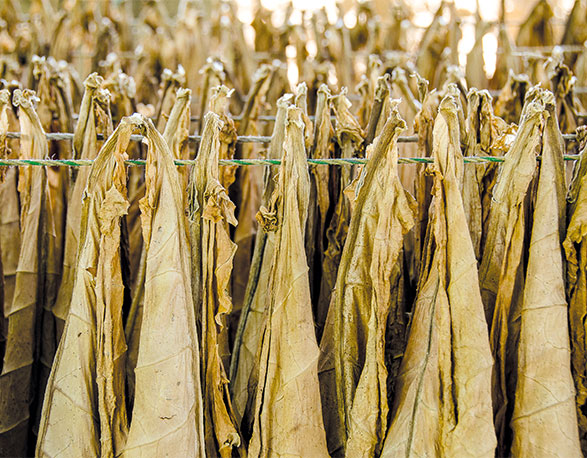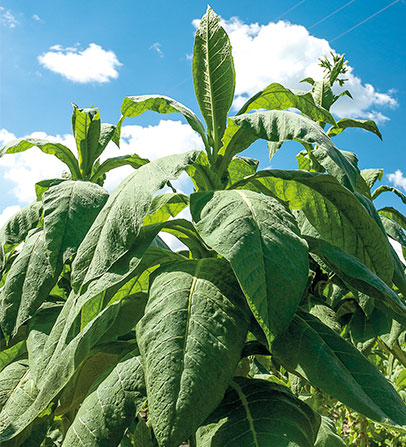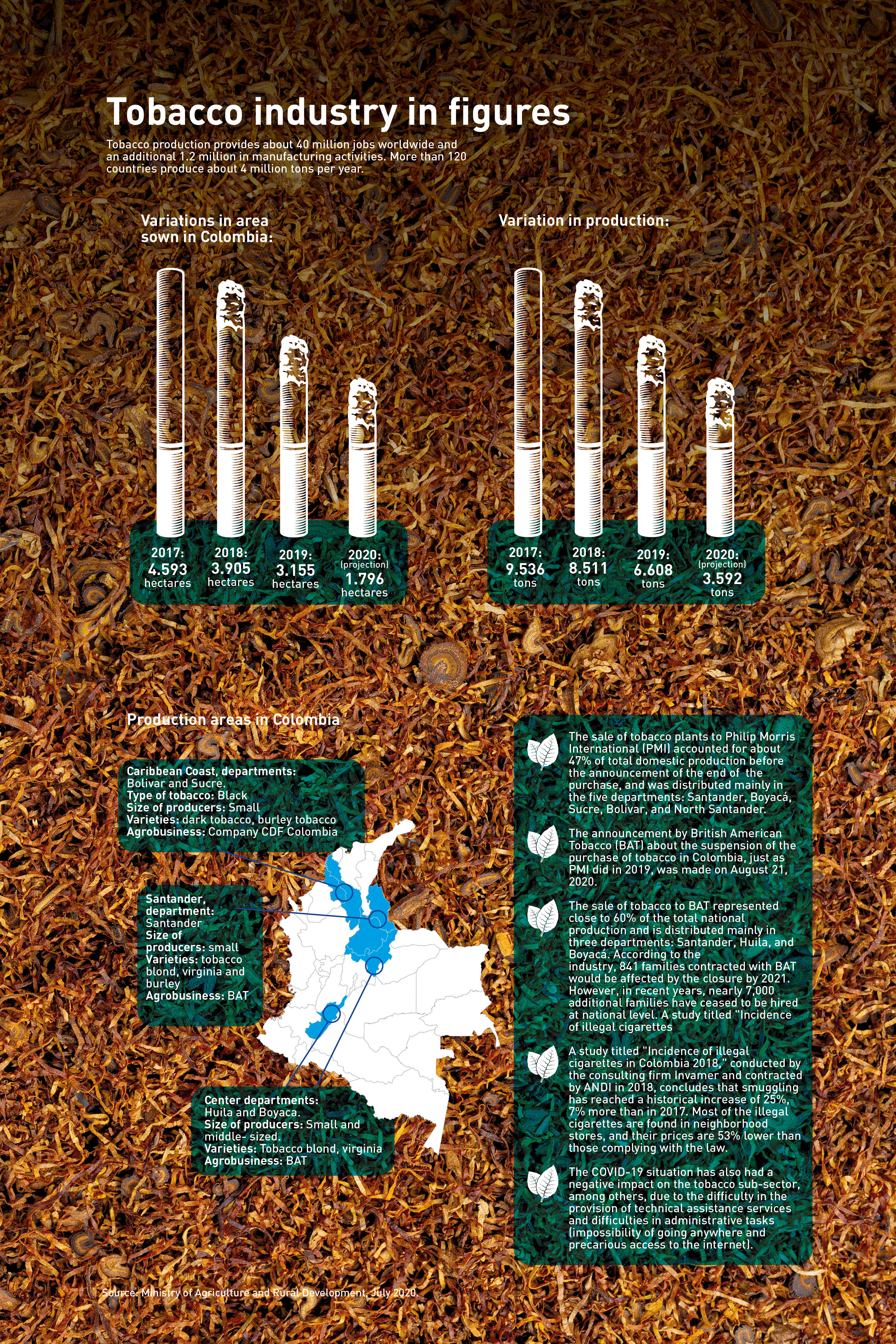Tobacco farmers in limbo
By: Alejandro Ramírez Peña
Photos:
Economics and Politics

By: Alejandro Ramírez Peña
Photos:
On June 5, 2019, Philip Morris International (PMI), with its brands Marlboro, L&M, Derby, Chesterfield, and Pielroja, officially announced the cancellation of its cigarette manufacturing lines in Medellín and Barranquilla (Colombia). The decision was attribut - ed to two reasons: increased smuggling and chang - ing market trend towards smoke-free options. However, the decision could also stem from other considerations within its regional and global strategy.
Truth is that the news surprised the national government, particularly the Ministry of Labor and, of course, the employees of Coltabaco (a company belonging to PMI since 2005) because of the strong labor impact that the decision would generate and the end of the purchase of tobacco at the termination of the harvest scheduled for late that year.
Although the Ministry’s portfolio reported the loss of employment for around 1,000 people, the National Union of Tobacco Industry Workers (Sintraintabaco) estimated that between 400 and 500 employees in Medellín, Barranquilla, and Santander would be affected, despite the fact that the company would take voluntary retirement proposals with sums equal to four years’ salary and, in some cases, 11 years’ salary.
This notice also affected tobacco farmers in the departments of Bolívar, Boyacá, Sucre, North Santander, and Santander, since, as Heliodoro Campos, president of the National Fed - eration of Tobacco Producers (Fedetabaco), commented to El Espectador, “Philip Morris used to buy around 50% of the national production and its exit will affect 2,300 farmers (by 2019) who work under the contract farming scheme; that is to say, they are in the growing when they have an assured buyer.”
It was precisely the situation of this group and the need to offer them a transition to other types of permanent crops motivated Leonel Criado, a master’s research student at the Universidad del Rosario’s Faculty of Economics, and his professors and advisors, Paul Rodríguez, Juan Miguel Gallego, and César Mantilla, to conduct the research study, Tobacco crop substitution: a lab-in-the-field experiment.
“The reason for addressing this issue was to study one of the unexplored topics—the tobacco chain and its production. First, together with Paul and César, we focused on the tobacco sector crisis last year, and then, we decided to conduct an economical experiment,” explains Criado.
Taking the farmers who sowed tobacco as the object of the study, the researchers outlined the following goals: first, to contribute to the agricultural research in Colombia, which is quite limited and second, to analyze the tobacco “epidemic” from the beginning of its production.
According to the researchers, the study also seeks to establish the best alternative for the transition of these tobacco growers to other products, considering that they are still sowing these crops, although for a small-scale commercialization.

Leonel Criado, a master's research student in the Faculty of Economics at the Universidad del Rosario, points out that the tobacco growing farmers received technical assistance had a secure sale because it was contract farming, with stable prices, which are now adrift.
On that line, researchers consider that the ideal way is to make a total migration to another crop, a decision that depends on knowing the best alternative between a permanent and transitory crop. Most farmers grow transitory crops because of their short production cycle and fast production rate; however, permanent crops have high stability in the long term, do not depend on several intermediaries, and, therefore, are more cost effective.
As alternatives, Criado describes that transitory crops depend on the geographical location, although today the most frequent ones are beans and corn. On the contrary, in the case of permanent crops, various options, such as avocado, coffee, and cocoa, are available, which will only become feasible if the farmer can establish a link with the corresponding federation.
Farmers face an uncertain transition
Although the researchers do not have conclusive results yet because they are debugging the database, Criado confirms that during field visits they found that the population depending on tobacco farming is suffering from serious problems because their activity comes from a tradition
In other words, tobacco growers have been sowing this crop generation after generation and are skilled only in that activity.
“They received technical assistance and had secure sales because of contract farming. Their prices were stable, but now they are adrift. This has led several farmers to venture into growing new products without any information on technicality, profitability, and commercialization, which caused many of them to lose their harvest. We are just beginning to understand this situation in the specific experiences we have witnessed during field trips and in some of the interviews we have conducted,” adds Criado.
The researchers point out that tobacco grew in hot weather, and the tobacco growers took advantage of the drought in the area. However, the alternative crops, bean and corn plantations, do need water. Because of water scarcity there, the farmers are losing their crops.
Criado explains that “there is a season when it is a good idea to sow these transitory crops, but in other seasons, it is not; the farmers did not have this information, making it difficult for them to address the problem. Unless they are properly informed, they cannot make the decision to get out of the crisis. About 7,000 families are involved in this business; some are still in the business of selling a more traditional type of tobacco, such as the “chicote” (traditional type of cigarrete used in Colombia). They produce tobacco and take it to Piedecuesta (Santander) for selling; however, with a great difference as the intermediaries buy it from them now and not a multinational corporation, which means that prices fluctuate and are not cost effective.”
For this reason, the tobacco growers are seeking government support and are asking for technical advice and a subsidy that would allow them to invest in a permanent crop, such as avocado or cocoa, and have a stable income during harvest ing and selling of the crop. Until that happens, they can continue experimenting with transitory crops regarding which they have little information and do not know how to operate in the market.
Although the researchers have found several news reports on such requests, they have not found evidence of a public policy on the matter. However, Criado points out that there was progress on the joining of institutions, such as the Rural Agricultural Planning Unit (UPRA) and the National Federation of Cereal Growers (FENALCE), with the government to find a more profitable alternative for these farmers, considering that the tobacco-growing area is suitable for some types of transitory crops. However, the pandemic arrived and the issue was forgotten.
Jordán, an emblematic case
No concrete figures on the number of families affected by the decision of the PMI corporation are available, but there is indeed some information about the impacts on some of them.
As reported by the newspaper Vanguardia, after the PMI‘s decision to leave the country, 1,340 families were affected. Only three companies used to buy tobacco in Colombia, and in terms of quantity, PMI was the second largest. Most of the tobacco growing families were located in Santander: 987, mainly in the municipalities of Curití, Villanueva, San Gil, Barichara, Jordán, and Aratoca. It is estimated that 1,096 hectares were no longer sown, 602 hectares of which lie in that area.
According to Fedetabaco, in 2019, 2,300 families were affected by the closure of the corporation, and in 2020, another 1,340 families were added to that list because they were no longer contracted by Coltabaco. It is estimated that the number is increasing and today around 7,000 additional families are impacted by this situation.
For these farmers, replacing tobacco with permanent crops, such as avocado or cocoa, is not possible because they sow on lands under lease and if they are pushed out of them, the crops would be left in nobody’s hands. Further, they claim that in most cases, no formal contract exists with the landowners.
This attracted Criado’s attention, particularly the events in Jordán, where several residents told him that large area of land is in the hands of a single owner, who is associated with the most influential family in the municipality in political terms or is now the mayor of the municipality. A phenomenon that comes from generation to generation, and therefore, he is increasingly taking over more and more extensions of land.
“In addition, it is a municipality that is isolated (taking almost three and a half hour to reach from Bucaramanga, covering a 107-km distance) from the rest of the department and country. It does not have an adequate supply of utilities, despite that it does receive funds to do so. Notably, a health center was built there but is completely abandoned today. It has neither the personnel nor the equipment to make it available to the population,” the researcher points out.
Criado believes that the municipality could leave the tobacco history aside and use its geographic location−Chicamocha canyon−as an advantage for boosting tourism. “With enough help, it could be boosted and thus have an alternative activity other than tobacco,” he says.
Researchers have precisely identified the provision of technical contributions in terms of crops and marketing as the greatest help to the farmers who lived off tobacco. Professor Mantilla repeats that the farmers were used to the fact that their payments and contracts with PMI were fixed and did not depend on price fluctuations. Therefore, unlike the rest of the farmers, their crops did not suffer from price fluctuations. Consequently, their ignorance in these matters can drastically affect their decisions.
“Land ownership and transitory crops can become a second problem because the transitory crops can expose them to risk. Thus, we want to understand what type of technical assistance or even in-kind or monetary subsidies would have to be generated for these farmers. Hence, our question arises: how can we motivate them to shift to permanent crops?” he emphasizes.
Professor Paul Rodríguez adds that part of the discussion that must take place globally is how to deal with this type of Dutch disease (a phenomenon that describes the harmful effects of the dependence of an economy’s wealth on the marketing of a single product). This is because crops, such as tobacco, generate a high dependence on people, as at first sight one would not know if they have the same capacity to operate in different situations.
“This is a huge problem because the tobacco business should be reduced, not only in Colombia, but also in several places worldwide where the clear purpose of politics is to reduce tobacco consumption as much as possible. While there are many efforts to do so from the aspects of public health, there have always been doubts about the implications for the families depending on the crop,” Rodríguez concludes.
Thus, the study revealed that the possible path is to transition to another crop with the support of the state, including financing and technical assistance.

Crops such as tobacco generate high dependence of people who at first sight one would not know if they have the same capacity to operate in different situations.
